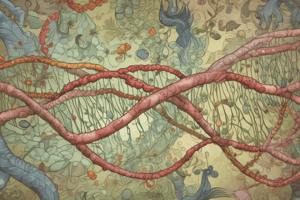Podcast
Questions and Answers
In codominance, how do both alleles contribute to the expression of a trait?
In codominance, how do both alleles contribute to the expression of a trait?
- Both alleles are expressed equally (correct)
- One allele is fully dominant over the other
- One allele masks the other
- Both alleles remain hidden
How does incomplete dominance differ from codominance?
How does incomplete dominance differ from codominance?
- Both alleles are expressed equally
- The phenotype is intermediate between the two parental alleles (correct)
- One allele is fully dominant over the other
- One allele masks the other
What is a classic example of incomplete dominance mentioned in the text?
What is a classic example of incomplete dominance mentioned in the text?
- Blood types O and A/B
- Color of flowers in certain species of snapdragons (correct)
- Sex-limited traits
- Blood type AB
In sex-limited traits, are they expressed in both sexes?
In sex-limited traits, are they expressed in both sexes?
How do sex-influenced traits differ from sex-limited traits?
How do sex-influenced traits differ from sex-limited traits?
Why are males more likely to be colorblind compared to females?
Why are males more likely to be colorblind compared to females?
The ABO blood group system involves __ alleles.
The ABO blood group system involves __ alleles.
In ABO blood group inheritance, an individual with genotype A-B will have blood type __.
In ABO blood group inheritance, an individual with genotype A-B will have blood type __.
What do non-Mendelian inheritance patterns involve in terms of alleles?
What do non-Mendelian inheritance patterns involve in terms of alleles?
Which statement is true regarding non-Mendelian inheritance patterns?
Which statement is true regarding non-Mendelian inheritance patterns?
Flashcards
Codominance
Codominance
Both alleles are expressed equally, contributing to the trait's expression.
Incomplete Dominance
Incomplete Dominance
Results in a phenotype that is intermediate between the two parental alleles, neither allele is fully dominant.
Sex-Related Traits
Sex-Related Traits
Traits expressed in only one sex (sex-limited) or showing varying expression based on sex (sex-influenced).
Multiple Alleles
Multiple Alleles
More than two alleles exist for a particular gene in the population.
Signup and view all the flashcards
Non-Mendelian Inheritance
Non-Mendelian Inheritance
Inheritance patterns that don't follow Mendel's simple rules, involving complex interactions between alleles and traits.
Signup and view all the flashcardsStudy Notes
Non-Mendelian Patterns of Inheritance
In the realm of genetics, we typically associate the inheritance of traits with the principles established by Gregor Mendel. However, some patterns of inheritance deviate from Mendel's simple one-to-one relationship between alleles and traits, instead exhibiting more complex dynamics. These non-Mendelian patterns provide us with a more diverse and nuanced understanding of how genes are inherited and expressed.
Codominance
In codominance, both alleles are expressed, contributing equally to the expression of a trait. This deviates from the dominant-recessive model where one allele masks the other. Blood types O and A/B are examples of codominance, as both alleles (O and A/B) are visible in a person with the blood type AB.
Incomplete Dominance
Unlike codominance, where both alleles are expressed equally, incomplete dominance results in a phenotype that is intermediate between the two parental alleles. This means that neither allele is fully dominant over the other. One well-known example of incomplete dominance is the color of flowers in certain species of snapdragons, such as Antirrhinum majus. Flowers with the red allele (R) and white allele (W) will display pink flowers.
Sex-Related Traits
In some cases, traits are sex-limited or sex-influenced. Sex-limited traits are only expressed in one sex, whereas sex-influenced traits show varying levels of expression depending on the sex. For example, the gene responsible for red-green colorblindness (RS) is on the X chromosome. Males are more likely to be colorblind because they only have one X chromosome, while females have two, providing them with a backup copy of the gene.
Multiple Alleles
Whereas Mendelian genetics is based on two alleles, non-Mendelian inheritance can involve multiple alleles. In these cases, the number of alleles can range from three to many more. For example, the ABO blood group system has three alleles (A, B, and O). An individual can carry two of these alleles (A-A, A-B, B-B, or A-O). The combination of these alleles determines their blood type.
In the next sections, we will explore these non-Mendelian patterns of inheritance with more specific examples, deepening our understanding of the complexities that DNA presents us with. Remember, however, that these patterns are not exclusive. A single trait can exhibit more than one type of non-Mendelian inheritance. Understanding these patterns and their exceptions allows us to better predict and analyze the inheritance of genetic traits in species across the tree of life.
Studying That Suits You
Use AI to generate personalized quizzes and flashcards to suit your learning preferences.




